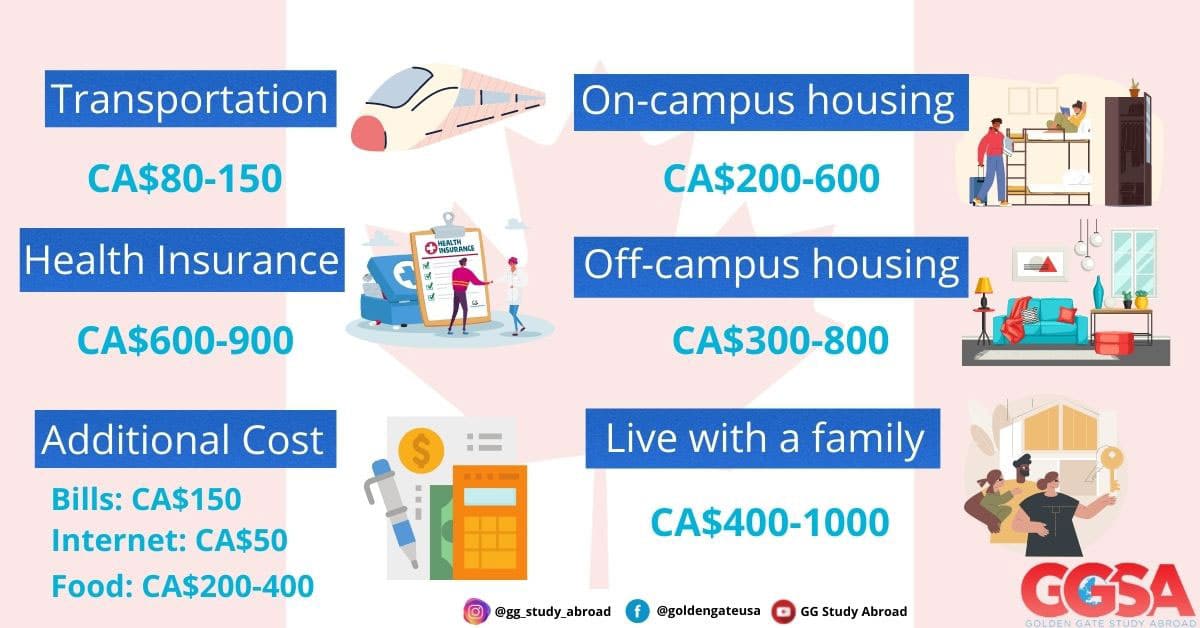Studying in Canada as an international student is an exciting opportunity, but it’s important to understand the cost of living before you arrive. From housing and food to transportation and entertainment, living expenses can add up quickly. In this blog post, we will break down the main costs you need to consider, helping you plan your budget and make the most of your time in Canada.

Cost of Living in Canada as an International Student
If you’re considering studying in Canada as an international student, it’s crucial to grasp the financial aspects of living in the country. This guide provides a detailed overview of the costs you might encounter, using Vancouver as a typical example. We’ll break down expenses like rent, utilities, transportation, and lifestyle choices, so you can budget effectively.
1. Rent in Vancouver
Rent is often the biggest expense for international students in Canada, especially in a city like Vancouver. Renting a one-bedroom apartment in Vancouver can be quite expensive, ranging from $1,600 to $2,400 per month. However, if you’re looking to save money, you might consider sharing a place with roommates. Shared accommodation is a more affordable option, costing between $500 and $1,000 per month. This allows you to split the rent and utilities, making it easier to manage your budget.
2. Utilities, Internet, and Cable
In addition to rent, you’ll need to budget for utilities, which include heating, cooling, water, garbage collection, and electricity. These typically cost around $102 per month. Internet and cable are also important for staying connected and entertained. For these services, you should expect to spend an additional $80 per month. Together, these costs add up, so it’s crucial to factor them into your budget.
3. Phone Plans
Canada is known for having relatively expensive phone plans, but there are options that cater to students. Basic phone plans in Canada range from $15 to $57 per month, depending on the features you need, such as data, talk time, and text messages. It’s a good idea to shop around for the best deal that fits your needs and budget.
4. Food and Groceries
When it comes to food, your budget will depend on whether you cook at home or eat out frequently. On average, you can expect to spend about $355 per month on groceries if you prepare most of your meals at home. This is a reasonable amount for a single student. However, if you prefer dining out, meals at restaurants usually cost between $15 and $35 each. Balancing home-cooked meals with occasional dining out can help you manage your food expenses effectively.
5. Transportation
Public transportation is a popular and cost-effective way for international students to get around Vancouver. A three-zone monthly pass costs $181 and gives you access to buses, SkyTrain, and SeaBus services. If you prefer driving, purchasing a new car in Canada will cost you around $19,500, with leasing options starting just over $200 per month. Keep in mind that driving also comes with additional costs like insurance, gas, and maintenance. Alternatively, biking or walking can be great ways to save money on transportation, especially if you live close to your school.
6. Lifestyle and Entertainment
Your lifestyle choices will greatly influence your entertainment expenses. For example, a movie ticket in Vancouver costs about $15, and alcoholic drinks average $8 each. If you’re into fitness, a gym membership will typically cost around $60 per month. Additionally, it’s wise to set aside about $200 per month for shopping or other leisure activities. How much you spend on entertainment will depend on your personal preferences and how often you engage in social activities.
7. Other Costs
Unexpected expenses can arise at any time, so it’s a good idea to have a financial cushion. Setting aside $200 per month for emergencies or additional costs can help you avoid financial stress if something unexpected comes up. Whether it’s a medical bill, a sudden trip, or a broken gadget, having a little extra money saved can be a real lifesaver.
